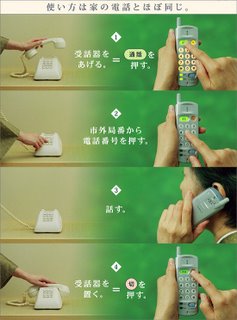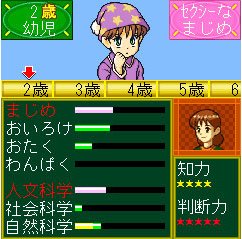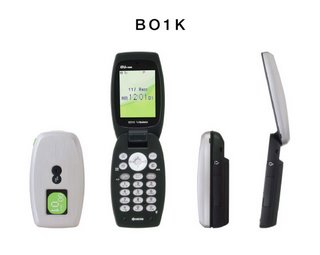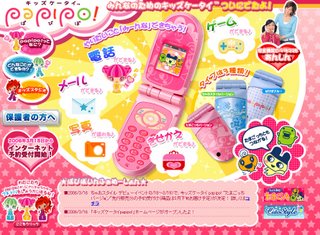Thursday, March 30, 2006
KDDI's second network winds down operations

Discounting PHS, Tu-ka is Japan’s smallest MNO with a current 3 million subscribers. The network shunned 3G services, positioning itself as a no-frills provider with simple handsets and basic services. This led to popularity amongst older users, especially with handsets such as the Tu-ka S which specifically targeted seniors as a phone ‘virtually identical to your house phone’. It seemed there was potential for Tu-ka in the future of Japan’s mobile market with seniors becoming an increasingly important target for operators.
Wednesday, March 29, 2006
Bandai judges book by its cover
Tuesday, March 28, 2006
Child-raising simulation quiz mobile game by Namco
The new game, with the catchy title 子育てクイズいつでもマイエンジェル (Child raising quiz – always my angel) puts the player in charge of a newborn baby girl. The player is then presented with various questions relating to child rearing and rewarded with money to spend on the child for correct answers. How the player spends this money and how they react to certain events has an effect on the child’s personality as it grows up.

Here the player is asked the correct temperature for giving milk to a baby.

The player's choices affect the child's personality - in this case sexy(!) but serious. The variables are seriousness, attractiveness, geekiness and naughtiness. There is also information on the child's future study path (humanities, sociology, science).
Subscription to the Namco mobile games site is 315 yen (around $2.70) per month.
Friday, March 24, 2006
Trademark applications hint to future mobile products and services
News website ITmedia did some research in the Japanese electronics patents library and discovered that operators have been pre-emptively applying for. Trademarks such as ‘Triple Fixed Price’ (KDDI), ‘Security Keitai’ (Fujitsu) and ‘Car Navi Keitai’ (KDDI), offer some insights into potential products and services of the future.
I did my own quick search on the UK Patent Office website to find out what trademarks the operators here have been registering and it turned up some interesting results. I wonder what a Virgin mobile 'lobster' could be...?
T-Mobile
Text Appeal
Office in your pocket
Hutchison
Gloatmail (something to do with sports apparently)
Vodafone
Vodafone Locate You
Big Mobile
WAPPY BIRTHDAY (and WAPPY CHRISTMAS, WAPPY NEW YEAR, WAPPY EASTER the list goes on…)
Hush call
O2
Moshi-moshi (Japanese greeting for when answering the phone)
Magic O2
Virgin Mobile
Micro snapper
Lobster
Thursday, March 23, 2006
Survey on colour and 'feel' of handsets published
Japanese mobile phone news site IT Media have just released the results of a survey carried out on over 1300 of their readers regarding their preferences for colouring and ‘feel’ of handsets. It should be kept in mind that 85% of respondents were male which will have an effect on the results.
 Firstly, respondents were asked what colour handset they would buy next, with the top five answers being black, white, red, silver and blue. Interesting to note was the popularity of skeleton (transparent), which came in seventh place despite the lack of transparent handsets on the Japanese market.
Firstly, respondents were asked what colour handset they would buy next, with the top five answers being black, white, red, silver and blue. Interesting to note was the popularity of skeleton (transparent), which came in seventh place despite the lack of transparent handsets on the Japanese market.
 Next readers were quizzed about the ‘feel’ of the handsets. Here matte was first choice with metallic following behind. Gloss came third despite a number of readers expressing a dislike for its tendency to become smeared by fingerprints. Interesting responses included ‘porcelain-style’ (8th) and ‘teddy bear-like’ (which was apparently popular amongst female respondents.
Next readers were quizzed about the ‘feel’ of the handsets. Here matte was first choice with metallic following behind. Gloss came third despite a number of readers expressing a dislike for its tendency to become smeared by fingerprints. Interesting responses included ‘porcelain-style’ (8th) and ‘teddy bear-like’ (which was apparently popular amongst female respondents.
Wednesday, March 22, 2006
Tokyo taxis to accept wallet phones
The Tokyo Wireless Taxi Union today announced that they will equip all taxi fleets from member companies with reader/writers to accept payment using DoCoMo wallet phones.
Initially, the taxis will only support the DoCoMo-backed iD credit card scheme but there are also plans to extend it to the ToruCa coupon system.
The wallet phone readers will be installed in around 5,500 taxis and the system should be operational by August this year.
Tuesday, March 21, 2006
Vodafone brand to be replaced in Japan
In a press conference last Friday, Masayoshi Son, CEO of Softbank, revealed his intentions for the Vodafone brand following his company’s recent acquisition of Vodafone’s Japanese arm.
Following much speculation, Son confirmed that the Vodafone brand will not stay and that a decision on a new brand would be made “as soon as possible”. The rebranding process itself is likely to last between six months and a year as advertising, shops, catalogues and handsets will all have to be stripped of the Vodafone logo.
There will inevitably be a period of overlap and this is likely to cause confusion and unease amongst consumers. During the rebranding process from J-Phone to Vodafone, there was a noticeable decrease in new subscribers during this transition period. Softbank’s proposed rebranding would coincide with the introduction of MNP inMonday, March 20, 2006
Handset designed especially for au business service goes on sale

Japanese operator au have recently been plugging their mobile services aimed at business users and today launched a new handset, the B01K by Kyocera, designed especially for use on au’s business service.
Rather than small and chic design, the makers believe that it is battery life that counts for businessmen on the road. The B01K comes with a chunky 1,200mAh battery which gives it a maximum talk time of around 5 hours 20 minutes. Security also features highly with the handset featuring a function that can erase the phone’s address book and other personal information in the event that the phone gets lost.
It seems that Kyocera are also aware that by targeting the businessman, there are many prospective owners from the older age bracket and have included functions such as a simple mode, large text and text-to-voice conversion of emails, to appeal to this demographic.
Friday, March 17, 2006
Willcom announce wireless kids safety device without the phone

On my journal on w2forum.com, I have written about several ways by which handset manufacturers in
The device is called doko-iruka, which can mean ‘where are you?’ but, as iruka is also Japanese for dolphin, the device (naturally!) takes on a cetacean theme. The device has only one button which turns ‘out of school mode’ off and on. When ‘out of school mode’ is on, the device sends location information to a server every 5 minutes which parents can check. The parents can also access on-demand location information whether ‘out of school mode’ is on or off. The device also has an emergency alarm, activated by pulling the dolphin’s tail off, which sends an email with the child's location to registered addresses.
The doko-iruka is a well-placed device for parents who are looking for safety devices for their children but are still uneasy about them having a fully functional mobile phone.
Thursday, March 16, 2006
Bandai unveils kids handset
 About a week ago on w2forum.com I wrote about a new handset designed for kids being manufactured by the toy maker Bandai. At the time there was very little information about the phone other than it would run on the Willcom network.
About a week ago on w2forum.com I wrote about a new handset designed for kids being manufactured by the toy maker Bandai. At the time there was very little information about the phone other than it would run on the Willcom network.
Yesterday Bandai unveiled the new handset and started taking pre-orders for the phone on its website, kidskeitai.com. Like the kids handsets on the DoCoMo and au networks, it comes with a range of safety features such as location tracking and restricted internet access. New features on the Bandai phone to note are a function which sends GPS information to parents when the phone’s battery is low or the power switched off and a range of pre-installed educational games designed to improve numeracy and literacy. The phone also has customisable covers and Bandai-themed content such as wallpapers and emoticons.
The phone is closely targeted at 7-12 year-olds and is the latest example of how operators in

